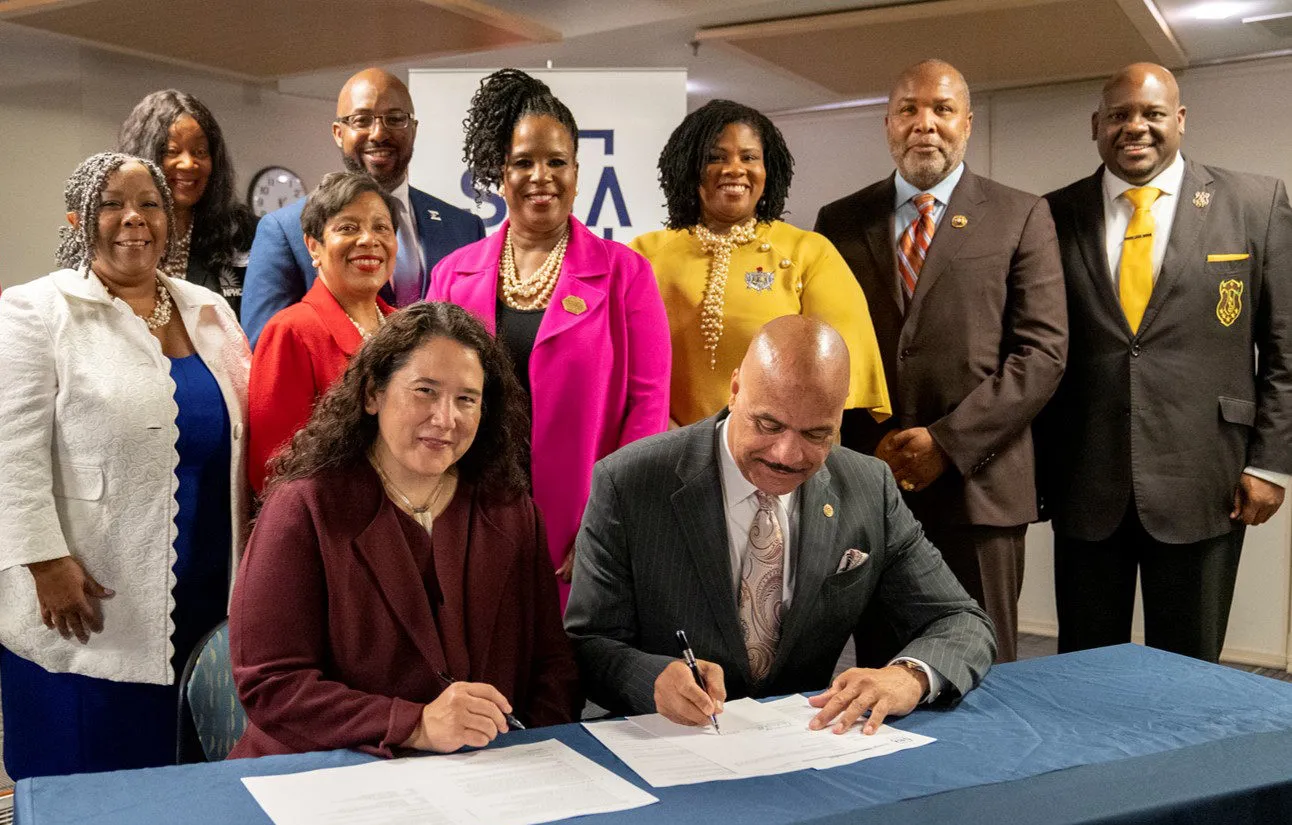Content
Background

Administrator Isabella Casillas Guzman and President Reuben A. Shelton III, Esq. sign a Strategic Alliance Memorandum, June 14, 2022
SBA and the National Pan-Hellenic Council (NPHC) began their work together in June 2022. NPHC’s Council of Presidents consists of nine historically Black fraternities and sororities. These are sometimes referred to as the “Divine Nine.”
- Alpha Phi Alpha Fraternity, Inc.
- Alpha Kappa Alpha Sorority, Inc.
- Kappa Alpha Psi Fraternity, Inc.
- Omega Psi Phi Fraternity, Inc.
- Delta Sigma Theta Sorority, Inc.
- Phi Beta Sigma Fraternity, Inc.
- Zeta Phi Beta Sorority, Inc.
- Sigma Gamma Rho Sorority, Inc.
- Iota Phi Theta Fraternity, Inc.
NPHC boasts over 2.5 million active members and scores of alumni members. NPHC members are leaders in civic, business, and faith communities. Strategic Alliance goals include:
- Helping SBA build trust in key communities
- Introducing small business owners to critical resources
- Bolstering business outcomes to help close the wealth gap
The four pillars of small business success
The goal of SBA’s work with NPHC is to build strong, sustainable businesses. In this, we are guided by four pillars:
Access to capital
SBA is dedicated to increasing capital for small businesses in underserved communities. This means ensuring access to both general lending programs and PPP forgiveness. SBA can also help businesses get products online or into global markets.
Learn more about SBA’s funding programs.
Government contracting
The U.S. government is the largest single purchaser of goods and services in the world. Over $560 billion annually is awarded for a wide variety of needs. Congress has annual goals for government contracting with small and disadvantaged firms. This helps innovative small businesses provide their talents and ideas to the federal government.
Learn more at SBA’s contracting guide.
Disaster recovery and resilience
SBA connects victims of declared disasters with disaster assistance programs. SBA also provides small business disaster resources, such as:
- Checklists to help businesses prepare for disasters
- Tips to improve disaster recovery outcomes
- Information on SBA’s response during disasters
- Loan programs to maintain economic resilience after disasters
Learn more about SBA’s disaster assistance.
Counseling/Technical assistance for business development
Business development and financial literacy are vital for small businesses to thrive and grow. SBA has the resources to help entrepreneurs build financial skills for success. SBA has instituted several major changes to level the playing field for all small businesses. These include the Community Navigator Pilot Program and our resource partners :
- Women’s Business Centers (WBCs)
WBCs provide free, to low-cost counseling and training. Their focus is on women who want to start, grow, and expand their small businesses. - Small Business Development Centers (SBDCs)
SBDCs provide counseling and training to small businesses. They also provide tools to support startups and existing business expansion. - SCORE Business Mentoring
SCORE is the nation’s largest network of volunteers. It provides expert business mentors at no cost to help small businesses plan, launch, manage, and grow. - Small Business Digital Alliance
This co-sponsorship agreement between SBA and Business Forward, Inc. Business Forward is a nonprofit organization working with small business leaders. They help connect small businesses with digital tools, trainings, and expanded opportunities. They also help grow their digital networks to reach new customers – all free of charge. Their Digital Tool Library has free trainings and webinars on how to start, grow, market, and fund small businesses. - Veterans Business Outreach Centers (VBOCs)
VBOCs provide business development to service members interested in starting or growing a small business. Resources are also available to veterans, National Guard and Reserve members, and military spouses.
Additional steps toward equity
SBA is taking steps to fulfill its Equity Action Plan. To that end, we expanded the Community Advantage (CA) Pilot loan program. This expansion prioritized access to capital for low-income borrowers and those from underserved communities. To help with this, SBA is releasing disaggregated data across industries and sectors by race and ethnicity. We are also helping to deliver contracting reforms to bring in new, diverse contractors.
